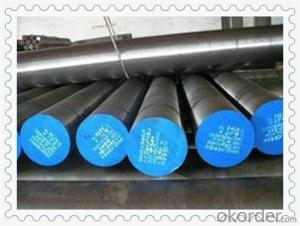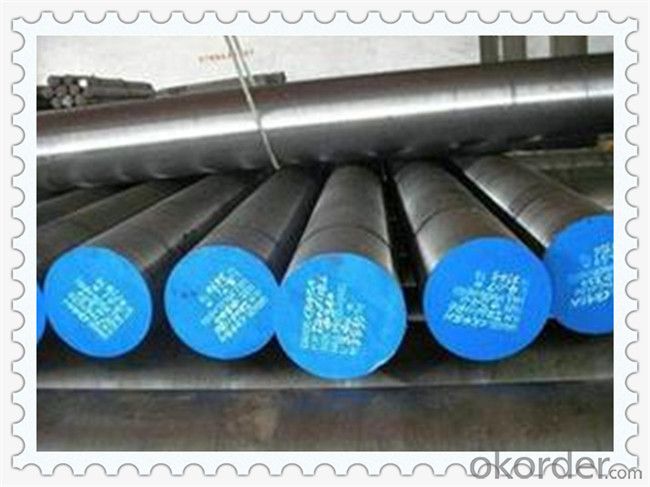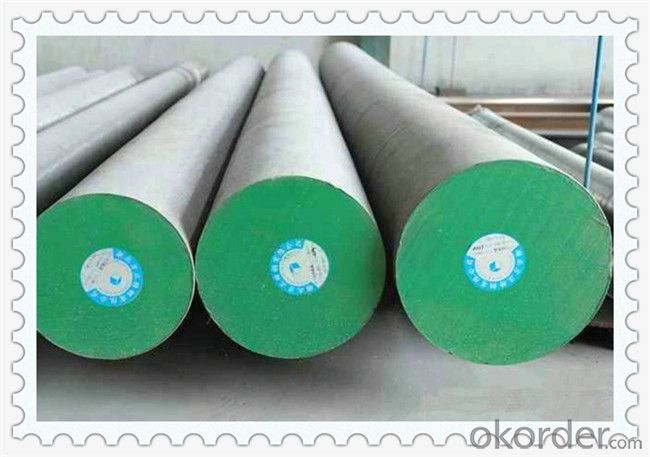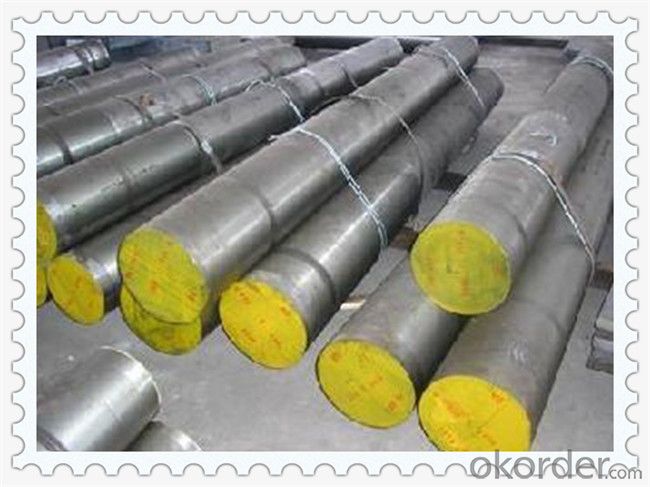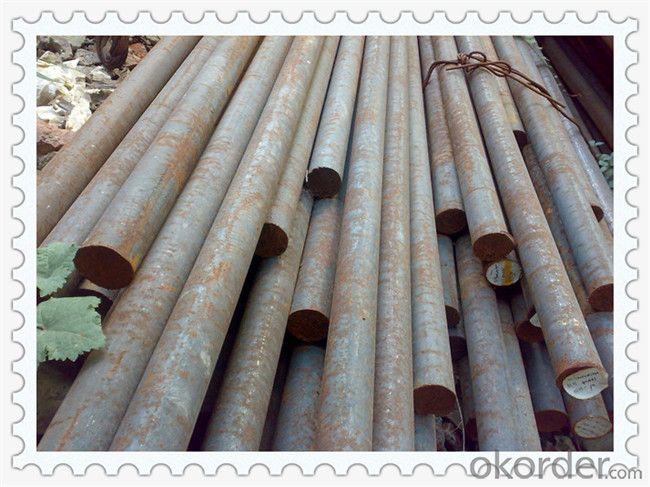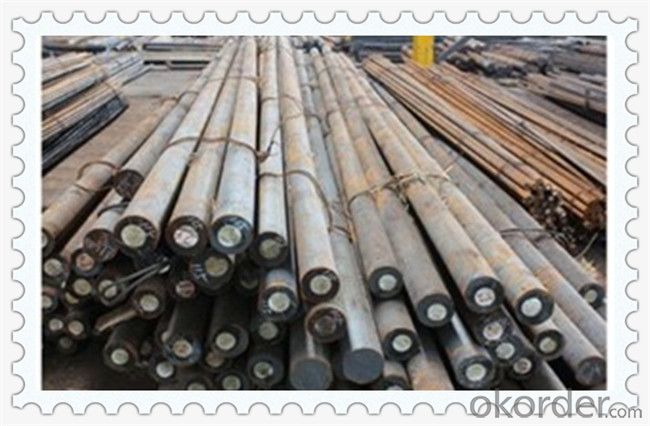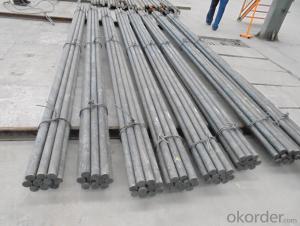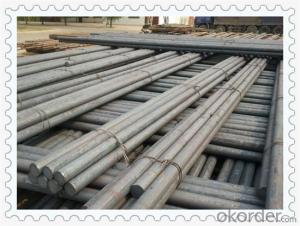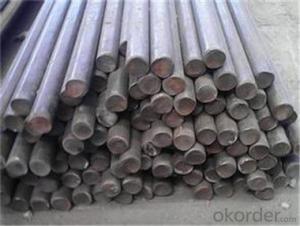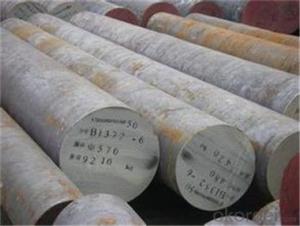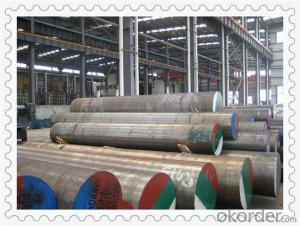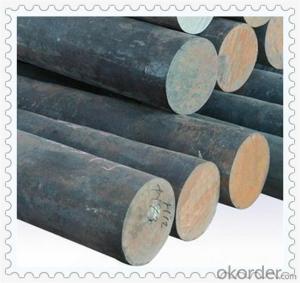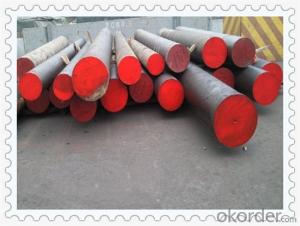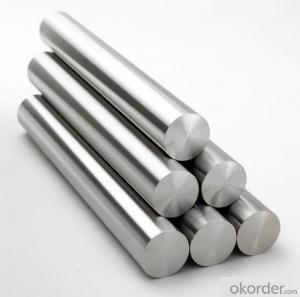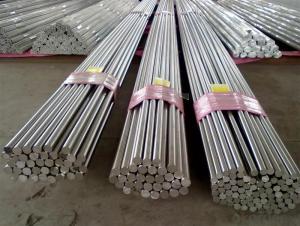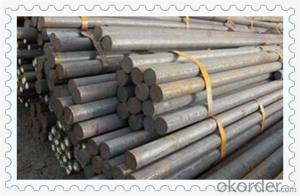Carbon Steel Rod SAE 1045 Round Steel Bar
- Loading Port:
- China main port
- Payment Terms:
- TT OR LC
- Min Order Qty:
- 50 m.t.
- Supply Capability:
- 10000 m.t./month
OKorder Service Pledge
OKorder Financial Service
You Might Also Like
Carbon Steel Rod SAE 1045 Round Steel Bar
Technical Paramenters
Chemical Composition | Mechanical Properties (In Quenched & Tempered State) | ||
C | 0.43-0.50 % | Tensile strength(MPA) | ≥600(61) |
Si | 0.17-0.37 % | Yield strength (MPA) | ≥355(36) |
Mn | 0.60-0.90 % | Elongation (δ5/%) | ≥16 |
Cr | ≤0.25 % | Reduction in Area (ψ/%) | ≥40 |
Ni | ≤0.30 % | Impact (J) | ≥ 39 |
P | ≤0.040 % | Impact toughness value αkv (J/cm2) | ≥49(5) |
S | ≤0.050 % | Hardness | ≤229HB |
Cu | ≤0.25 % | ||
Products Show
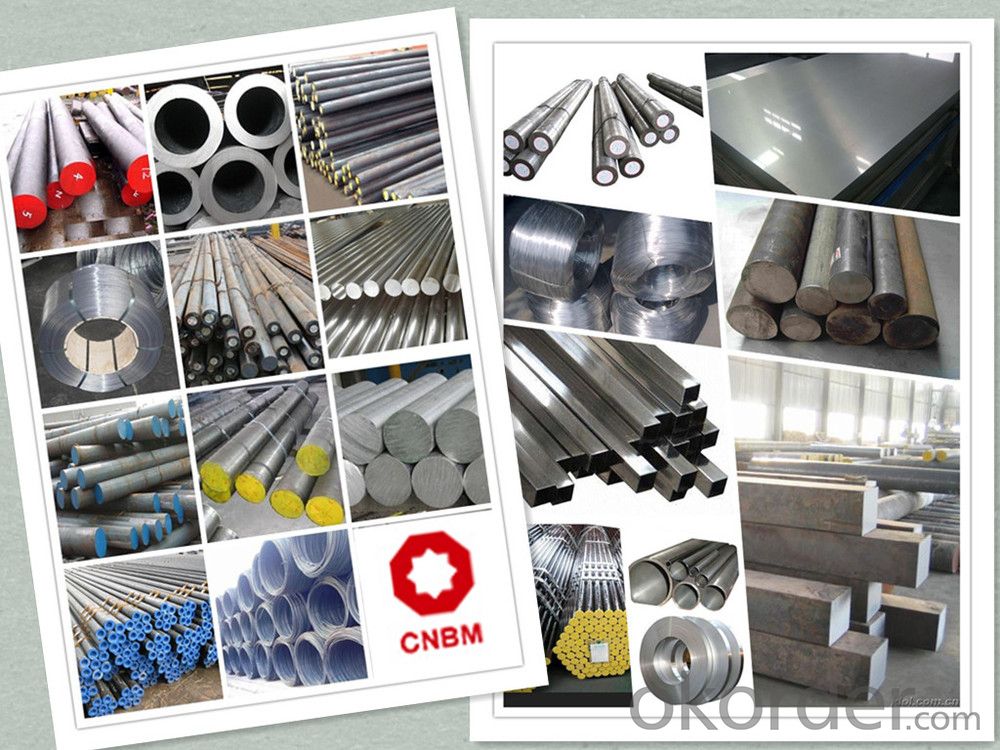
Product Overviews
| Product Name | Typical Grades | Diameter(mm) | Standard adopted |
| Carbon Steel | 20 (1020/S20C/C22) | Ø16-Ø300 |
GB/SAE/JIS/DIN
|
| 40 (1040/S40C/C40) | |||
| 45 (1045/S45C/C45) | |||
| Bearing Steel | GCr9 (51100/SUJ1) | Ø12-Ø250 | |
| GCr15 (52100/SUJ2/100Gr6) | |||
| GCr9SiMn (A485-Gr.1/SUJ3) | |||
Cr-Mo Steel | 20Cr (5120/SCr420H/20Cr4) | Ø12-Ø250 | |
| 40Cr (5140/SCr440/41Cr4) | |||
| 42CrMo(4140/SCM440/42CrMo4) | |||
| Gear Steel | 20CrNiMo | Ø16-Ø600 | |
| 20CrMn(5115/SMnC420/20MnCr5) | |||
| 20CrNiMo(8620/SNCM220/20CrMiMo2) |
Work Shop
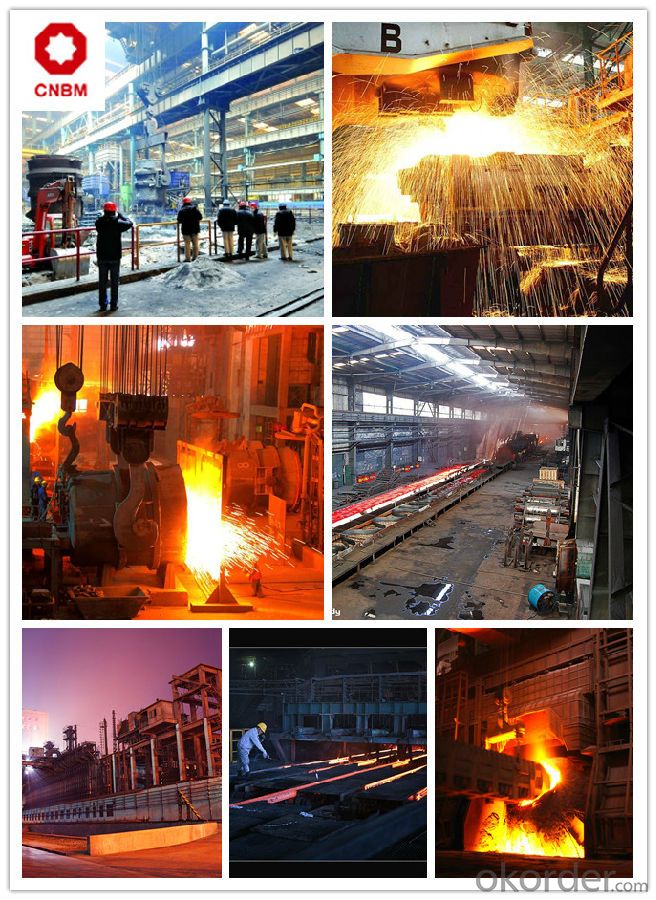
Company Information
CNBM International Corporation is the most important trading platform of CNBM group.
Whith its advantages, CNBM International are mainly concentrate on Cement, Glass, Iron and Steel, Ceramics industries and devotes herself for supplying high qulity series of refractories as well as technical consultancies and logistics solutions.

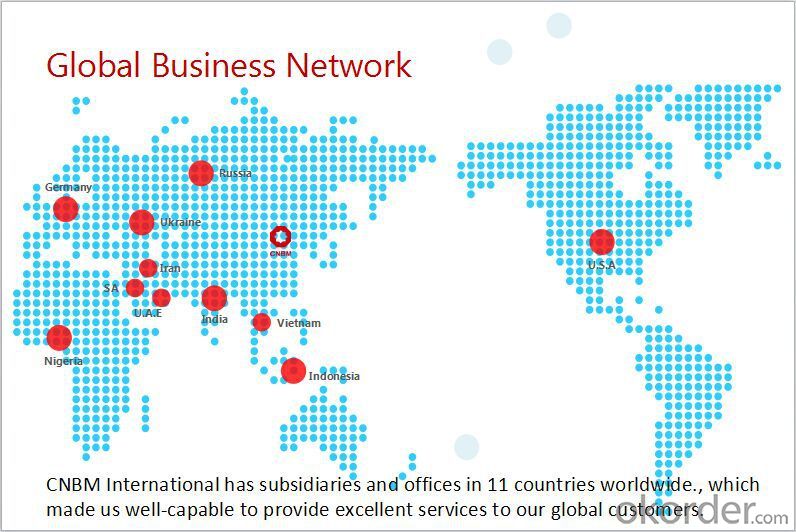
FAQ
1, Your advantages?
professional products inquiry, products knowledge train (for agents), smooth goods delivery, excellent customer solution proposale
2, Test & Certificate?
SGS test is available, customer inspection before shipping is welcome, third party inspection is no problem
3, Factory or Trading Company?
CNBM is a trading company but we have so many protocol factories and CNBM works as a trading department of these factories. Also CNBM is the holding company of many factories.
4, Payment Terms?
30% TT as deposit and 70% before delivery.
Irrevocable L/C at sight.
5, Trading Terms?
EXW, FOB, CIF, FFR, CNF
6, After-sale Service?
CNBM provides the services and support you need for every step of our cooperation. We're the business partner you can trust.
For any problem, please kindly contact us at any your convenient time.
We'll reply you in our first priority within 24 hours.
Packaging & Delivery
1, Packaging: seaworthy package or as required
2, Delivery: 35-45 days or based on quantity
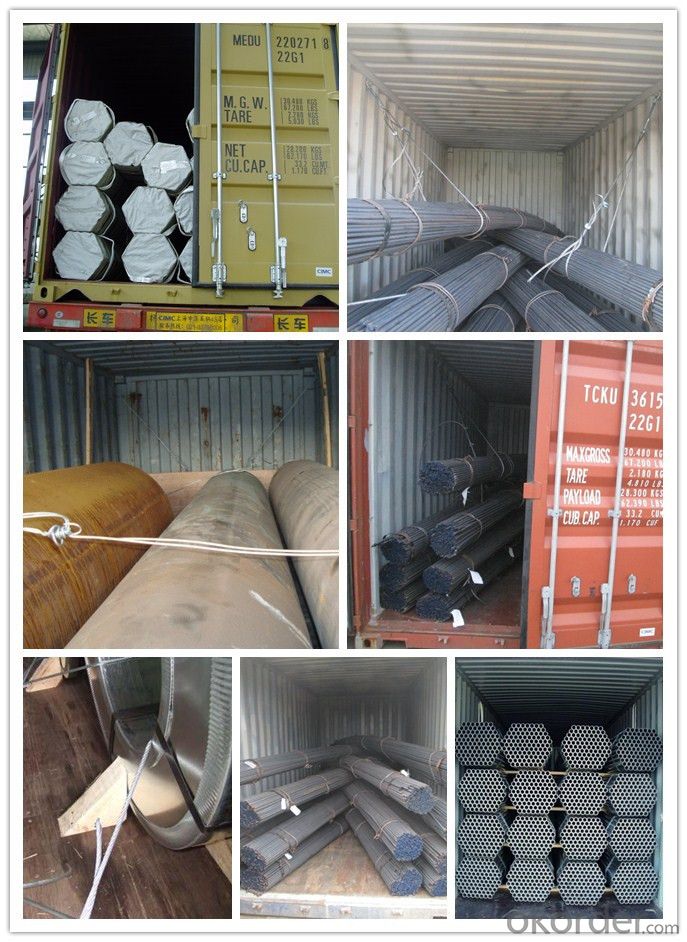
- Q: Can steel round bars be used for shafts or axles?
- Yes, steel round bars can be used for shafts or axles. Steel round bars are commonly used for these applications due to their high strength, durability, and ability to withstand heavy loads and torsional forces. They can be machined and shaped to fit specific requirements, making them suitable for various industrial and mechanical applications.
- Q: How are steel round bars stored and transported?
- Steel round bars are typically stored and transported using a variety of methods to ensure their safety and ease of handling. When it comes to storage, steel round bars are often stored in warehouses or outdoor yards. In these facilities, the bars are usually stacked horizontally on racks or placed on steel stands to prevent any damages or deformations. It is important to keep the bars off the ground to avoid contact with moisture and potential rusting. To facilitate transportation, steel round bars are commonly bundled together using steel straps or chains. These bundles are designed to keep the bars tightly secured and prevent any movement during transit. Additionally, the bundles are often labeled with relevant information such as the type of steel, dimensions, and weight to ensure proper identification and handling. When it comes to transportation, steel round bars can be shipped using various modes such as trucks, trains, or ships. Trucks and trains are commonly used for shorter distances, while ships are preferred for longer hauls, especially for international shipments. Depending on the size and weight of the bars, they can be loaded onto flatbed trucks or placed in shipping containers for transportation. During transportation, it is crucial to avoid any potential impacts or mishandling that could cause damage to the bars. Proper securing and bracing techniques are employed to minimize any movement or shifting of the bars in transit. This can include using blocking and bracing materials to prevent the bars from rolling or sliding. In summary, steel round bars are stored in warehouses or outdoor yards and are often bundled together using steel straps or chains. They are transported using trucks, trains, or ships, ensuring proper securing and bracing to prevent damage. By following these storage and transportation practices, steel round bars can be delivered to their destinations safely and efficiently.
- Q: How do you measure the straightness tolerance of a steel round bar?
- To measure the straightness tolerance of a steel round bar, you can use a variety of methods depending on the accuracy and precision required. Here are a few common techniques: 1. Visual Inspection: This is a simple method where you visually inspect the bar for any visible deviations from straightness. You can place the bar on a flat surface and look for any bends or curves along its length. However, this method is subjective and may not provide precise measurements. 2. Straightedge Method: In this method, you place a straightedge, such as a ruler or a precision straightedge, against the bar's surface and check for any gaps or spaces between the straightedge and the bar. This method provides a more accurate measurement but can still be influenced by human error. 3. Dial Indicator Method: This method involves using a dial indicator, which is a precision measuring tool, to measure the straightness tolerance. You secure the dial indicator to a fixed point and then move it along the length of the bar, noting any deviations from a straight line. This method provides more precise measurements and can be used to quantify the straightness tolerance in terms of a specific unit of measurement, such as inches or millimeters. 4. Laser Measurement: Laser systems, such as laser alignment devices, can be used to measure the straightness tolerance of a steel round bar. These systems use lasers to project a straight line onto the surface of the bar and then measure any deviations from this line. Laser measurement provides highly accurate and repeatable results, making it suitable for applications that require tight tolerances. It is important to note that the choice of measurement method depends on the required accuracy, the size of the round bar, and the available resources and equipment. Additionally, it is recommended to consult industry standards and guidelines to ensure compliance with specific tolerances and requirements for your application.
- Q: Can steel round bars be used in manufacturing equipment?
- Steel round bars find extensive usage in the manufacturing industry, owing to their diverse advantageous properties. Renowned for their exceptional strength, durability, and resistance to wear and tear, these bars prove to be an ideal choice for heavy-duty machinery and equipment. They play a crucial role in the production of vital components such as shafts, axles, pins, and gears, which are indispensable for the smooth operation of machinery. Moreover, steel round bars possess the ability to be effortlessly machined, welded, and molded into various shapes, thus showcasing their versatility in different manufacturing applications. Consequently, steel round bars emerge as a dependable and extensively utilized material in the manufacturing industry for equipment construction.
- Q: How are steel round bars used in the mining industry?
- Steel round bars are widely used in the mining industry for a variety of applications. One of the most common uses is in the construction and reinforcement of underground support systems. These bars are often used as roof bolts or rock bolts to provide stability and prevent cave-ins or roof falls in underground mines. Steel round bars are also used in the manufacturing of drilling equipment. They are frequently used as drill rods or drill bits, providing the necessary strength and durability to withstand the harsh conditions of drilling in mining operations. These bars are typically heat-treated to increase their hardness and resistance to wear, ensuring their longevity in the drilling process. Another important application of steel round bars in mining is in the production of grinding media for grinding mills. These bars, known as grinding rods, are used to grind and crush ore particles in the milling process. They are made from high-quality steel and have a specific hardness and toughness to effectively break down the ore into smaller particles, facilitating the extraction of valuable minerals. Additionally, steel round bars are used in the construction of conveyor systems in mining operations. They are commonly used as support bars or rollers in conveyor belts, ensuring the efficient transport of mined materials from one location to another. In summary, steel round bars play a crucial role in the mining industry. From providing support and stability in underground mines to manufacturing drilling equipment and grinding media, these bars are essential in various mining processes, contributing to the overall efficiency and productivity of mining operations.
- Q: What is the difference between a rough turned and a seamless steel round bar?
- A rough turned steel round bar refers to a bar that has undergone a preliminary turning process, where excess material is removed to achieve a desired shape or size. On the other hand, a seamless steel round bar is manufactured without any seams or welds, ensuring a smooth and uniform surface throughout the entire length of the bar. Essentially, the difference lies in the manufacturing process and the resulting surface finish.
- Q: What are the different types of steel round bar alloys used in the construction industry?
- There are several different types of steel round bar alloys commonly used in the construction industry. Some of the most popular alloys include: 1. Carbon Steel: This is the most common type of steel alloy used in construction. It is known for its high strength and durability, making it suitable for a wide range of applications. 2. Stainless Steel: This alloy is highly resistant to corrosion and staining, making it ideal for construction projects where exposure to moisture or chemicals is a concern. It is often used in applications such as handrails, kitchen equipment, and structural components. 3. Alloy Steel: This type of steel contains additional alloying elements such as manganese, chromium, or nickel, which enhance its mechanical properties. Alloy steel round bars are known for their high tensile strength, toughness, and wear resistance, making them suitable for applications that require heavy-duty performance. 4. Tool Steel: As the name suggests, this alloy is specifically designed for making tools and machinery components. Tool steel round bars are known for their hardness, resistance to abrasion, and ability to retain their shape at high temperatures. They are commonly used in the construction industry for making cutting tools, dies, and molds. 5. Duplex Steel: This alloy combines the properties of both austenitic and ferritic stainless steels. Duplex steel round bars offer excellent corrosion resistance, high strength, and good weldability. They are often used in construction projects where a combination of strength and corrosion resistance is required, such as in marine or coastal environments. Overall, the choice of steel round bar alloy in the construction industry depends on the specific application and requirements of the project. Each alloy offers unique properties and advantages, allowing construction professionals to select the most suitable option for their needs.
- Q: What is the tolerance for diameter and length of steel round bars?
- The tolerance for diameter and length of steel round bars can vary depending on the specific industry standards and requirements. Generally, the acceptable tolerance for diameter can range from +/- 0.005 to 0.010 inches, while for length it can range from +/- 0.125 to 0.250 inches. However, these tolerances can be more stringent or relaxed depending on the intended application and customer specifications.
- Q: What are the advantages of using nickel-aluminum alloy steel round bars?
- There are several advantages to using nickel-aluminum alloy steel round bars. Firstly, these bars have excellent corrosion resistance, making them suitable for use in harsh environments or applications where they may come into contact with corrosive substances. Secondly, the alloy steel composition provides high strength and durability, making these bars capable of withstanding heavy loads or extreme temperatures. Additionally, nickel-aluminum alloy steel round bars offer good thermal conductivity, allowing for efficient heat transfer in various applications. Lastly, these bars are easily machinable, enabling precise shaping and customization to meet specific project requirements.
- Q: What are the different testing methods for steel round bars?
- There are several testing methods employed to assess the quality and performance of steel round bars. These methods include: 1. Tensile Testing: Tensile testing is conducted to determine the strength and elasticity of steel round bars. It involves applying a force to the bar until it reaches its breaking point, measuring the maximum load it can withstand before fracture occurs. This test helps to determine the ultimate tensile strength, yield strength, and elongation of the steel. 2. Hardness Testing: Hardness testing is used to assess the resistance of steel round bars to indentation or scratching. Common methods include the Rockwell, Brinell, and Vickers hardness tests. These tests provide valuable information about the material's ability to resist wear, deformation, and surface damage. 3. Charpy Impact Testing: Charpy impact testing measures the toughness and resistance to brittle fracture of steel round bars. The test involves striking a notched sample with a pendulum, measuring the energy absorbed during fracture. This test is crucial in evaluating the material's behavior under sudden impact or dynamic loading conditions. 4. Ultrasonic Testing: Ultrasonic testing utilizes high-frequency sound waves to detect internal flaws or defects in steel round bars. This non-destructive testing method can identify cracks, inclusions, or voids that may compromise the structural integrity of the material. 5. Magnetic Particle Inspection: This testing method is used to identify surface cracks or defects in steel round bars. It involves magnetizing the material and applying iron particles or magnetic ink. Any surface cracks or flaws will cause a leakage of magnetic flux, making them visible under proper lighting. 6. Visual Inspection: Visual inspection is a basic yet essential method for evaluating the quality of steel round bars. It involves examining the bar's surface for any visible defects, such as pits, scratches, or irregularities in shape or dimensions. 7. Chemical Analysis: Chemical analysis helps determine the composition of steel round bars by measuring the percentage of various elements present in the material. This information is crucial in ensuring that the steel meets the required specifications and is suitable for its intended application. Overall, a combination of these testing methods is employed to ensure the quality, performance, and reliability of steel round bars in various industries such as construction, manufacturing, and engineering.
Send your message to us
Carbon Steel Rod SAE 1045 Round Steel Bar
- Loading Port:
- China main port
- Payment Terms:
- TT OR LC
- Min Order Qty:
- 50 m.t.
- Supply Capability:
- 10000 m.t./month
OKorder Service Pledge
OKorder Financial Service
Similar products
Hot products
Hot Searches
Related keywords
